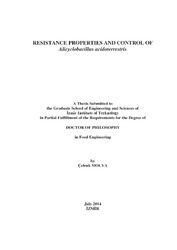Please use this identifier to cite or link to this item:
https://hdl.handle.net/11147/4234| Title: | Resistance Properties and Control of Alicyclobacillus Acidoterrestris |
| Other Titles: | Alicyclobacillus Acidoterrestris'in Kontrolü ve Direnç Özellikleri |
| Authors: | Molva, Çelenk |
| Advisors: | Baysal, Ayşe Handan |
| Keywords: | Alicyclobacillus acidoterrestris Fruit juice industry |
| Publisher: | Izmir Institute of Technology |
| Abstract: | Spoilage caused by Alicyclobacillus acidoterrestris is a significant problem for the fruit juice industry. Since A. acidoterrestris can withstand to high temperatures and acidic environments, it has been suggested as the target organism for the design of thermal processes of fruit juices. On the other hand, little is known about the effect of the sporulation media on the wet–heat resistance characteristics. Moreover, the control of vegetative cell growth and spore germination in fruit juices by natural antimicrobials needs to be studied. Therefore, the objectives of this study were to determine the effects of sporulation media on the thermal inactivation kinetics of A. acidoterrestris DSM 3922 spores in the reconstituted apple juice using different sporulation media; to test the antimicrobial activities of natural plant extracts (grape seed and pomegranate fruit extract), to investigate the growth characteristics in pomegranate juice and pomegranate–apple blend juices (10–80%, v/v); and finally to observe the structural changes using scanning electron and atomic force microscopy. The results of this study clearly showed that spores had different structural, physicochemical and wet–heat resistance properties depending on the sporulation media. Especially, higher wet–heat resistance was obtained from spores produced on mineral containing media. In addition, the high heat resistance of spores was correlated to their higher dipicolinic acid content and Ca2+ ions in the core. Nevertheless, the required dose to inhibit spore germination in the apple juice with natural extracts and in pomegranate and blend juices (40% and 80%) was dependent on the type of antimicrobial, its concentration and sporulation media. Also, the growth of vegetative cells was inhibited in the apple juice with grape seed and pomegranate extracts; and in pomegranate and blend juices (40% and 80%). Then, the experimental inactivation data were fitted satisfactorily using the Weibull model. Microscopic studies suggested that the phenolic compounds in these natural extracts and juices might cause the leakage of cellular components from the cells and prevent the development of the spores into vegetative forms. The results obtained in this study will provide contributions for the design of thermal processes and to prevent the spoilage caused by A. acidoterrestris in the fruit juice industry. |
| Description: | Thesis (Doctoral)--Izmir Institute of Technology, Food Engineering, Izmir, 2014 Includes bibliographical references (leaves: 137-159) Text in English; Abstract: Turkish and English Full text release delayed at author's request until 2017.08.06 |
| URI: | http://hdl.handle.net/11147/4234 |
| Appears in Collections: | Phd Degree / Doktora |
Files in This Item:
| File | Description | Size | Format | |
|---|---|---|---|---|
| 10013300.pdf | DoctoralThesis | 15.82 MB | Adobe PDF |  View/Open |
CORE Recommender
Page view(s)
300
checked on Jun 10, 2025
Download(s)
260
checked on Jun 10, 2025
Google ScholarTM
Check
Items in GCRIS Repository are protected by copyright, with all rights reserved, unless otherwise indicated.